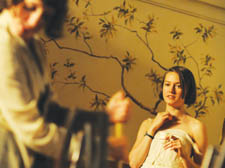|
|
 |
| |

Lydia Wilson as Desiree in Martin Crimp’s version of Bruckner’s Pains of Youth |
Gripped by Viennese vice
PAINS OF YOUTH
National Theatre
A PECULIARLY Germanic kind of intellect is at work in this drama by Ferdinand Bruckner, one of several heavyweights who emerged from Vienna in the 1920s, the decade of Freud, Zweig, Kraus and Schnitzler.
It is a play so concentrated and precise that you can sense its author’s veiny temples and pursed lips – but it is this production, rather than the play itself, which really grips you. The striking set and stark score are cold, mechanical and creepy. There is an urgency about the action, and the atmosphere is such that even if you cannot follow the complicated dialogue, you will get swept up in it.
Pains of Youth, presented here in a new version by Martin Crimp, owes much to the Pleasure Principle and other Freudian ideas.
Its setting is the University of Vienna, and it concerns a group of students – not the kebab-guzzling, traffic cone-wearing variety, but the studious, sophisticated types so often portrayed as cerebral villains in films and novels.
That other association with students – sex – is also rife here, with more than a nod to old Sigmund.
Critics are divided as to whether this play is as erotic as it’s cracked up to be, with one calling it “as sexy as a cold hip bath”.
I disagree.
The scene in which wolf-like predator Freder (Geoffrey Streatfeild) and clever nymph Desiree (Lydia Wilson) manipulate their friend Lucy (Sian Clifford) into “going on the game” is a masterclass in tense power-play.
In another scene, literary fop Petrell (Leo Bill) quickens pulses with his sweaty imploring of Marie (Laura Elphinstone).
The lesson here is that plays with no sex in them are not necessarily unsexy – just as plays bristling with flesh can be a turn-off.
Though there is no sex in this play, it is nonetheless dangerously erotic.
Fundamentally, this play is about the compromises we make as we get older. “It’s only when you’re older that you realise: everyone should shoot themselves at 17,” says Desiree, whose death instinct surfaces in the second act.
Would it be pushing it too far to describe Pains of Youth as prophetic? Given the course of Viennese history in the 1930s, the cruel irony of the play’s ending seems fitting.
But whatever else, it seems those interested in sexual revolution should look not to America in the 1960s but to Vienna in the golden years of the 1920s.
Until January 21 2010
020 7452 3000 |

|
| |
| |
 |
|
|
 |
|



